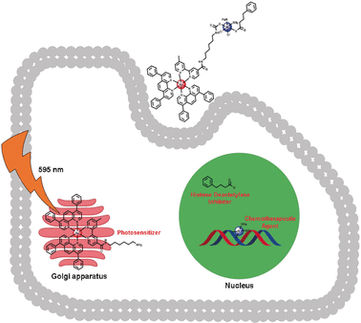New platinum compound shows promise in tumor cells
Advertisement
MIT chemists have developed a new platinum compound that is as powerful as the commonly used anticancer drug cisplatin but better able to destroy tumor cells. The new compound, mitaplatin, combines cisplatin with another compound, dichloroacetate (DCA), which can alter the properties of mitochondria selectively in cancer cells. Cancer cells switch their mitochondrial properties to change the way they metabolize glucose compared to normal cells, and DCA specifically targets the altered mitochondria, leaving normal cells intact.
"This differential effect conveys on mitaplatin the ability to kill cancer cells selectively in a co-culture with normal fibroblast cells, the latter being unaffected at the doses that we apply," says Stephen Lippard, the Arthur Amos Noyes Professor of Chemistry.
The chemists designed mitaplatin so that when it enters a cell, it releases cisplatin and two units of DCA by intracellular reduction. Therefore, mitaplatin can attack nuclear DNA with cisplatin and mitochondria with DCA. DCA promotes the release of cell-death-promoting factors from the mitochondria, enhancing the cancer cell-killing abilities of cisplatin.
Lippard's laboratory has shown that in rodents, mitaplatin can be tolerated at much higher doses than cisplatin, and they have begun studies in mice transplanted with human tissues. If those results are promising, the researchers plan more studies for further demonstration of mitaplatin's ability in cancer therapy.
Original publication: Shanta Dhar and Stephen Lippard; "Mitaplatin, a potent fusion of cisplatin and the orphan drug dichloroacetate."; Proceedings of the National Academy of Sciences 2009.






















































